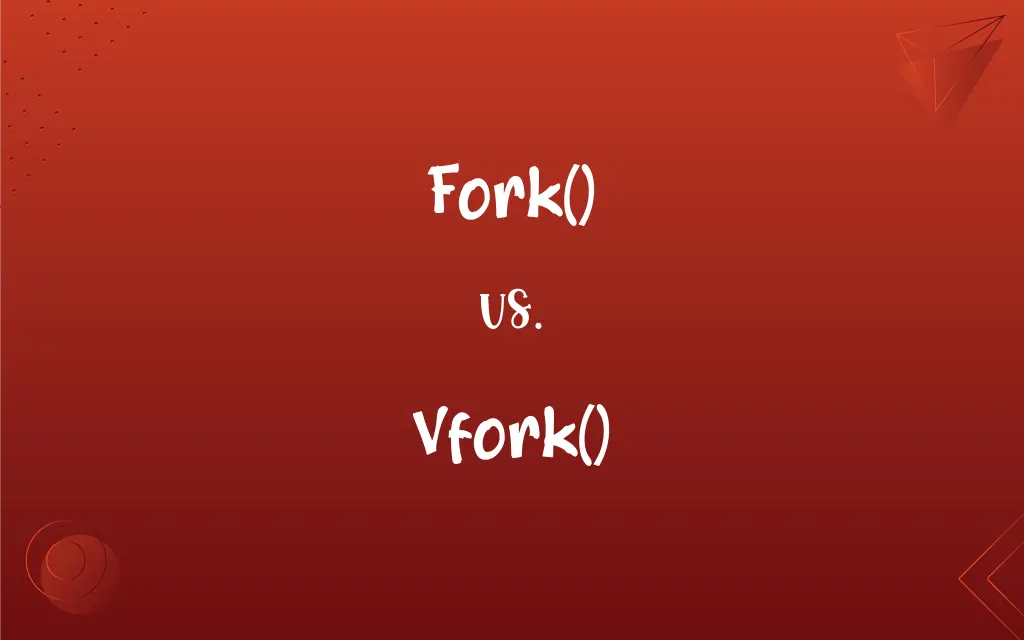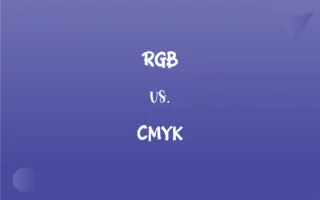Fork() vs. Vfork(): What's the Difference?
Edited by Aimie Carlson || By Janet White || Published on November 22, 2024
The fork() creates a new process by duplicating the calling process, while vfork() is a variant that shares the address space with the parent process until execve() is called or it exits.

Key Differences
Fork() creates a new process (child) by duplicating the parent process's address space. vfork(), on the other hand, is designed to create a child process without copying the address space of the parent process, sharing the same space until the child calls execve() or exits.
Fork() involves copying the entire address space of the parent, which can be resource-intensive. vfork() is more efficient in terms of memory usage, as it does not create a separate address space for the child process.
Fork() can be slower, especially when the parent process has a large memory footprint, due to the overhead of copying the address space. vfork(), being lighter in memory usage, is typically faster, particularly in systems with limited resources.
Fork() is safer and more commonly used because it isolates the parent and child processes. vfork() should be used cautiously, primarily when performance is critical, and the child immediately calls execve() or exits.
Fork() is generally more stable and reliable, as the separate memory spaces mean the parent and child processes do not interfere with each other. vfork() can lead to issues if the child process modifies the shared address space improperly.
ADVERTISEMENT
Comparison Chart
Memory Usage
Copies the parent's address space
Shares the parent's address space
Performance
Slower due to memory copy
Faster as no memory copy is performed
Process Isolation
Parent and child are isolated
Parent and child share the address space
Typical Use Cases
General-purpose process creation
Fast process creation for execve() or exit
Impact on System Stability
More stable and reliable
Can be less stable due to shared resources
ADVERTISEMENT
Fork() and Vfork() Definitions
Fork()
Fork() allows independent execution of parent and child.
We use fork() so that the child process can run a different program.
Vfork()
Vfork() is a special case optimization of fork().
In our script, vfork() is used for efficiency in process creation.
Fork()
Fork() creates a separate, duplicate process.
The server uses fork() to handle each incoming connection.
Vfork()
Vfork() is efficient for quickly running execve() or exiting.
Vfork() is ideal when the child immediately calls execve().
Fork()
Fork() returns twice, once in each process.
After calling fork(), we check the return value to determine if we're in the parent or child.
Vfork()
Vfork() creates a child process without copying memory.
We use vfork() in our memory-constrained embedded system.
Fork()
Fork() is used for traditional process creation.
In our multi-process application, fork() is used to create worker processes.
Vfork()
Vfork() shares the address space with the parent.
With vfork(), the child process directly affects the parent's memory.
Fork()
Fork() copies the parent's memory space for the child.
After fork(), the child process has its own memory space.
Vfork()
Vfork() can lead to problems if misused.
Incorrect use of vfork() can cause instability in our application.
Fork()
A utensil with two or more prongs, used for eating or serving food.
FAQs
Is vfork() faster than fork()?
Yes, generally, due to less memory usage.
What does fork() do?
It creates a new process by duplicating the calling process.
Can fork() and vfork() be used interchangeably?
No, they have different implications for memory usage and process behavior.
What is vfork() used for?
For creating a new process without duplicating the parent's memory space.
Why is vfork() considered risky?
Because the child shares the parent's address space, leading to potential data corruption.
Can fork() create multiple processes?
Yes, it can be called multiple times to create several processes.
What should a vfork() child process do?
It should either call execve() to run a new program or exit immediately.
How does fork() affect memory usage?
It increases memory usage by copying the parent's address space.
Can fork() lead to performance issues?
It can, especially in systems with large memory footprints.
Is vfork() deprecated in modern systems?
In many systems, vfork() has been replaced by more efficient fork() implementations.
What happens if a vfork() child modifies data?
It affects the parent process's memory, which can cause unpredictable behavior.
When should I use fork() over vfork()?
When process isolation and memory integrity are more critical than performance.
How does vfork() benefit memory-constrained environments?
By not duplicating the parent's memory, it uses less memory.
Do fork() and vfork() share file descriptors?
Yes, file descriptors are shared between parent and child in both cases.
How does vfork() affect multitasking?
It can be more efficient but must be used carefully to avoid issues.
What are the main risks of using vfork()?
Shared memory space risks and potential for data corruption if not used properly.
Are there alternatives to fork() and vfork()?
Yes, like clone() in Linux, which offers more control over process creation.
Can fork() be used in multithreaded applications?
Yes, but it requires careful handling of resources and locks.
Is vfork() suitable for complex operations in the child?
No, it's best used for simple operations like immediately executing a new program.
What is the return value of fork() and vfork()?
Both return the child's process ID to the parent and 0 to the child.
About Author
Written by
Janet WhiteJanet White has been an esteemed writer and blogger for Difference Wiki. Holding a Master's degree in Science and Medical Journalism from the prestigious Boston University, she has consistently demonstrated her expertise and passion for her field. When she's not immersed in her work, Janet relishes her time exercising, delving into a good book, and cherishing moments with friends and family.
Edited by
Aimie CarlsonAimie Carlson, holding a master's degree in English literature, is a fervent English language enthusiast. She lends her writing talents to Difference Wiki, a prominent website that specializes in comparisons, offering readers insightful analyses that both captivate and inform.







































































